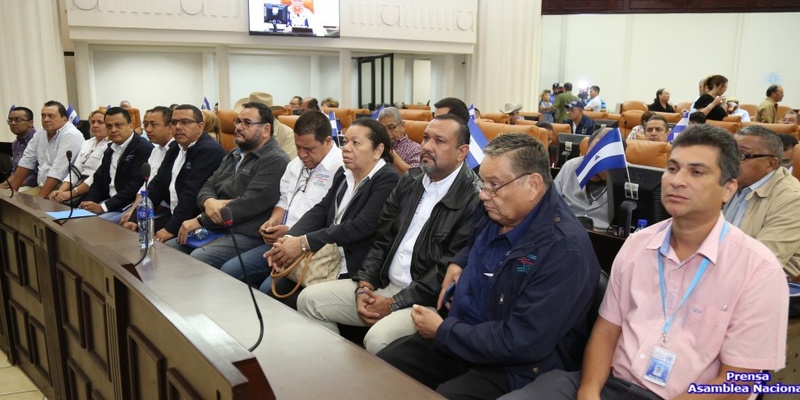Implementing the IPPC Phytosanitary Capacity Evaluation helped Nicaragua approve their revised phytosanitary law in record time
Posted on Tue, 31 Mar 2020, 09:05

NPPO staff involved in conducting the PCE attended the approbation of the revised Phytosanitary law. @ Prensa Asamblea Nacional de Nicaragua
Managua, 11 March – Thanks to the IPPC Phytosanitary Capacity Evaluation (PCE) tool, Nicaragua improved its phytosanitary legislation in record time. On Wednesday, 11 March 2020 - less than three months from the implementation of the PCE in the country - the courthouse of Managua, Nicaragua approved the revision of the Nicaraguan phytosanitary law.
Nicaragua successfully implemented the PCE in 2019 as part of the FAO project “Asistencia técnica para incrementar la eficiencia del sistema de vigilancia fitosanitario de Nicaragua” (TCP/NIC/3702/C2-TCPF). The PCE was facilitated by Mr Francisco Gutierrez, Technical Director of Plant Health in Belize, under the supervision of Ms Sarah Brunel, IPPC Implementation Facilitation Unit Deputy Lead. The Instituto de Proteccion y Sanidad Agropecuaria (IPSA) coordinated the implementation of the PCE in the country. In particular, Mr Martin Rosales and Mr Fernando Leal, respectively IPSA Head of the Department of Surveillance and Director of Planning, were responsible for coordinating the project at the national level under the guidance of Mr Ricardo Somariba, Executive Director of the institute.
Besides the development of a National Phytosanitary Capacity Development Strategy to strengthen IPSA, encompassing both institutional and technical aspects, the PCE helped Nicaragua revise the Phytosanitary Law from 1998. As this legislation was lacking several components to be fully compliant with the IPPC, consensus workshops were organized as part of the PCE process with the participation of relevant stakeholders, including representatives of producers, importers, exporters, customs, as well as the ministries of environment and forestry. These workshops were led by Mr Pablo Wilson, FAO international lawyer, with the technical support of two lawyers from IPSA, Ms Mercedes Perez and Mr Santiago Rodríguez, to discuss in details the various articles to be included in this revised law. The FAO Officer, Mr Alfonso Martinuz, facilitated the PCE process every step of the way.
The revised Phytosanitary law of Nicaragua contains 95 articles and is now fully aligned with the IPPC’s text and its obligations, including modern provisions for e-Commerce and ePhyto. The active participation of relevant stakeholders in the reviewing process of the Nicaraguan’s phytosanitary regulation helped government officials understand and value the need to modernize this Phytosanitary law in order to guarantee food security and respond more efficiently to international trade requirements. As indicated by one producer, Mr Douglas Alemán, plant pests and diseases are the main threat for producers and the development of their activities. That is why, a new law was considered of fundamental importance to help ensure safe production of commodities to be exported. This remarkable achievement of Nicaragua shows how a PCE can help set priorities and be the driving force to modernize countries’ phytosanitary legislations. This is a great pilot case for Latin America, and other contracting parties are encouraged to follow Nicaragua’s example.
The revised phytosanitary legislation of Nicaragua has been posted as part of the National Reporting Obligations and is available at the following link:

